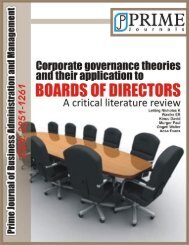See Full Article [pdf] - Prime Journals
See Full Article [pdf] - Prime Journals
See Full Article [pdf] - Prime Journals
You also want an ePaper? Increase the reach of your titles
YUMPU automatically turns print PDFs into web optimized ePapers that Google loves.
<strong>Prime</strong> Journal of Business Administration and Management (BAM)Vol. 2(2), pp. 457-465, February 22nd, 2012www.primejournal.org/BAMReviewThe legality of Islamic banking in Nigeria: A criticalapproachAbdul Azeez Maruf OlayemiPh.D research candidate in International Islamic University, Malaysia.Accepted 20 th December, 2011Dual banking system has emerged the current order of the global economic system. The dualization of thebanking system is generally construed in the context of the practicing of the non-interest Islamic bankingsystem alongside the conventional interest-based banking system. The system is currently in practice in thebest economic jurisdictions of the world, and it has been proved to be viable. Hence, the Nigerian federalgovernment moves to improve its banking system, by its dualization to meet the country’s economicchallenges. However, the proposal is met with stiff rejection from a religious group. This paper takes a criticallook at the premises on which the objection is based. It also examined the legal basis for the introducing of theproduct into the Nigerian banking system. Nevertheless, the outcome of the study shows that, the introducingof the non-interest Islamic banking product into the Nigeria banking system is lawful and its benefits to thecountry abounds.Key words: Islamic banking, banking system, financial institution, religion, NigeriaINTRODUCTIONNations, like plants and human beings, grow. And if thedevelopment is thwarted they are dwarfed andovershadowed (Claude 2011). Aspiring to grow and jointhe league of the advanced economic countries of theworld, the Nigerian federal government through theCentral Bank of Nigeria (CBN), approved the introductionof Non-Interest Financial Institution vis-a-vis the Islamicbanking product into the Nigerian Banking system(Mustapha Salihu, Soludo approved Islamic banking –Sanusi). The Islamic Banking has evolved over thedecades around the world and it has emerged as themost impermeable shield against all sort of economicdownturn. The system is in practice across the world,including some of the most economically strongcountries, such as UK (Islamic Bank of Britain (IBB) plc,PO Box 12461, Birmingham, B16 6AQ), USA (PaulWiseman, Islamic loans turn profit for banks in USA, USATODAY), Germany (Deutsche Bank Launches Sharia-Compatible Funds), Italy (First Islamic bank in Italy),France (Eleanor Beardsley, France Adjusts Laws ToAllow Islamic Banking), Singapore (1st Islamic Bankin Singapore), Japan (Jasim Ali, Islamic finance is gainingimportance in non-Muslim nations), China (Islamicfinance reaches China), Malaysia(http://www.bnm.gov.my/index.php?ch=13&cat=banking&type=IB>), Australia, South Africa (IslamicBanking in Africa) and even the Vatican city(Developments in Islamic Banking), to mention a few.Surprisingly, the disposition of the Central Bank isperceived by some group as a way of promoting Islamicreligion in the country (The body that opposed Islamicbanking are not the Christian community in Nigeria. Thepeople that oppose it are the Christian politician thatfind their way into the exalted office of CAN). Thisgenerated a very heated and a dangerous debate thatincludes threat of legal battle and war-fair from both sideof the argument(http://www.punchng.com/Articl.aspx?theartic=Art20110727115281). The questions that are raised by theanti-Islamic banking group include; alleged disparity inthe definitions of „Non-Interest Financial Institution‟,between the Guideline of the Non-Interest Financial,2011, and the Banking and other Financial Institution Act,
PJ Bus. Admin. Manag. 459time to time (Section 3.1, Framework for theRegulation and Supervision of Institutions OfferingNon-Interest Financial Services in Nigeria,FPR/DIR/CIR/GEN/01/010, January 13, 2011)‟.In a nutshell, the protagonists of Islamic bankingtherefore conclude that it was the diligent and brilliantwork of the Nigerian legislature that culminated in thelegality of introducing profit and loss banking, otherwiseknown as Islamic banking into the Nigerian bankingsystem. Therefore, it is the Nigerian lawmakers in theirwisdom who envision the need for Nigeria to join theleague of the nations that practice dual banking systemby allowing the operation of Islamic banking. However,having adduced the argument of the protagonists ofIslamic banking in Nigeria, as maintain by theprotagonists of Islamic banking, it will be appropriate, atthis juncture, to examine the premises on which thearguments of the antagonists of Islamic banking funded.The antagonist of Islamic bankingThe antagonist of Islamic banking in their part, premisedtheir arguments on four different legal questionsregarding the Nigerian banking legal framework. Thearguments are as follow:That there is Variation in the Definition of „Non-InterestFinancial Institution‟ between „BOFIA 1991‟ and „NIFIGuideline, 2011‟The antagonists of Islamic banking claim that there is avariation between the definitions of „Non-InterestFinancial Institution/ Profit and loss banking‟ in BOFIA,1991 and the Guideline of Non-Interest FinancialInstitution, 2011, and consequently, alleged that theintroduction of Islamic banking in the country to the extentof such variation is illegal.However, the protagonists of Islamic banking argue inthis regard that the claimed of variation or contradiction inthe definitions of such laws is nothing but a mereintellectual confusion. They assert that, had theantagonists of Islamic banking taken a critical look at thedefinitions with a view to sustain objectivity, they wouldhave realized that despite the appearance of differencesin the words of the definitions, the wordings do not deferas such, they are rather synonymous in meaning andpurpose. The definitions are as follow:BOFIA, 1991, Section 61, Non-Interest FinancialInstitution is: a bank which transacts investment orcommercial banking business and maintains profits andloss sharing accounts (BOFIA, 1991, Section 61)‟.The Guideline of Non-Interest Financial Institution, 2011,Non-Interest Financial Institution is : a bank or otherfinancial institution under the purview of the Central Bankof Nigeria (CBN), which transacts banking business,engages in trading, investment and commercial activitiesas well as the provision of financial products and servicesin accordance with the Shariah principles and rules ofIslamic commercial jurisprudence (The Guideline ofNon-Interest Financial Institution, 2011).Thus, the reality is that the application of shariah rulesand the principles of Islamic jurisprudence aretantamount to the operation of „profit and loss sharingaccount as reflects in the Section 61 of BOFIA, 1991.Therefore, the argument that the establishment of Islamicbanking is illegal based on the alleged inconsistency ofdefinitions does not arise in any way because what theprinciples of shariah and the rules of Islamic commercialjurisprudence requires in banking system is the operationof „profit and loss sharing account. In fact, it is this statute(as the paramount regulatory law for banking in Nigeria)that provides for the establishment of Non-InterestFinancial Institutions in the country, and in reality, theonly overtly known non-interest banking system in theworld today is Islamic banking. Thus, save if the hardworkof the Nigerian legislature which led to theenactment of the Section 61 of BOFIA, 1991 will bejeopardized, the only way to implement the Section 61 ofBOFIA, 1991, is to give way for the introduction of Islamicbanking product into the Nigerian banking system.Undoubtedly, no reasonable Nigerian will allow the hardwork of his legislators to be jeopardized.Moreover, the difference between BOFIA, 1991 and theNIFI Guideline, 2011, as legal instruments, should beidentified. BOFIA, 1991 is an Act of parliament while NIFIGuideline, 2011 is a delegated legislation which is meantto amplify and address the ambiguous and unresolvedareas in the Section 61 of BOFIA, 1991. The Guideline isto be explicit on all that is required to put the Section intopractice. In other words, a delegated legislation is a lawwhich is made by a person or body other thanParliament, such as the Central Bank of Nigeria (CBN);the law may be in the forms of a Guideline, Framework orRegulation. Its importance is to clarify the parts of thestatutes which need further clarification or explanation forproper implementation (http://www.lawteacher.net/english-legal-system/resources/delegatedlegislation.php).Therefore, the function of the Guideline of NIFI 2011, inthis sense, is to be explicit and specific in its definition ofIslamic banking, as against the generic definition of theBanking and Other financial Institution Act (BOFID)1991). Thus, the guideline shed light on the BOFIA,1991‟s definition of Non-Interest Institution‟, as „a bankwhich transacts investment or commercial bankingbusiness and maintains profits and loss sharingaccounts‟, that it is;„…a bank or other financial institutionunder the purview of the Central Bank of Nigeria (CBN),which transacts banking business, engages in trading,investment and commercial activities as well as theprovision of financial products and services in
460 Abdulaccordance with the Shariah principles and rules ofIslamic commercial jurisprudence‟‟. For furtherunderstanding of the definition, there is a need for theexplanation of the account that is maintained by Islamicbank.A close study of the practices of Islamic banking systemshows that the account which it maintains in itsoperations is based on the doctrine of profit and losssharing system (Ahmad Sanusi Hussin and Md. Alibin Md. Sariff, Islamic Banking Handbook, FinancialSector Talent Enrichment Programme, (InstitutBank-Bank Malaysia (35880), 2010), at 36). In otherwords, Islamic bank maintains „profit and loss sharingaccount‟ in all its practices (Other models of thetransaction of the bank such as al-Murabarah, BBA,al-Inah, al-Twaruq, etc… are also more or lessprofit sharing system, because they are not interestbased). That is, at both the micro and the macro levelsof banking operation systems. For instance, although,Islamic bank operates on the same template with theconventional bank, in term of the creation of depositfacilities, such as deposit account, current account,saving account, investment account etc. for theconvenience of its customers, however, its practicesdefers from the conventional practice as regards thecontracts that governs the relationship between the bankand the customers. The relationship between thedepositors and the bank under the conventional bankingsystem is a „debtor-creditor relationship (T. A. Ibitoye &O. A. Ajayi, Elements of Banking, (Ibadan: Bash-Moses Printing Company, 1999), at 154)‟, whereas inthe Islamic banking system, the relationship between thedepositor and the bank is „investor-entrepreneurrelationship (Ahmad Sanusi Hussin and Md. Ali binMd. Sariff, ibid)‟, that is, a partnership relationship.Thus, while interest is paid to a depositor on hisdeposited money in the conventional bank, the profitsthat accrue or loss that is incurred from the partnership ofthe „invested fund‟ of the depositor in the Islamic bank isshared between the bank and the customer. Mostly thecontract between a depositor and a bank under Islamicbanking system is al-mudarabah contract (Ibid), whichsimply means „profit sharing and loss bearing contract‟. Inthis regard, the argument on whether Islamic bankproduct is inclusive in the Non-Interest Financialinstitution which was generally provided for in the Section61 of BOFIA, 1991, and was explicitly clarify in theGuideline of NIFI 2011, is unfounded; it has no basis infact and in law. The introduction of Islamic banking intoNigerian banking system is based on nothing, but theprofit and loss sharing account as provided in Section 61of BOFIA, 1991.Furthermore, looking at the macro level of the Islamicbanking operations, that is, the Islamic financial markettransaction which includes; the capital market, moneymarket, the forex market etc. In reality, the products areknown in the conventional banking system. However, theIslamic banking fashion of the products defers, in that, itsoperation in the macro level is based on investor andentrepreneur relationship in the capital market, andbetween the central bank and the commercial banks andother financial institutions in the money market, andamong the banks and other financial institution in theinterbank money market, as opposed to the creditordebtorrelationship of the conventional system. In shortthe relationship of the participants in the macro level ofthe Islamic financial institution is basically profit and losssharing relationship otherwise known as al-mudarabahcontract/relationship (Ibid, 176).Thus, it can be seen that the macro and micro levels ofthe banking system which are the core areas of thebanking system, are operated on the basis of profit andloss sharing in the Islamic banking system. Therefore, itwill be illogical to conclude that merely because Islamicbanking draws its modus operandi from the principles ofIslamic law of transaction „al-muamalat‟, which forbidsusury, gambling, speculations, uncertainty, but legalizestrade and the principle of justice (certainty) in its dealings,the „profit and loss sharing‟ of its model is not in tandemwith the provision of the Section 61 of BOFIA 1991. Thisstatutory provision does not draw any line of demarcationbetween the practices of „profit and loss sharingaccounts‟ of the Non-Interest Financial Institutionsystems. It is actually inclusive of the Islamic bankingproduct and any other credible profit and loss sharingproducts of the banking system.In this regard, it can only be logical and reasonable toinsist that, the Banking and other Financial InstitutionsAct (BOFIA) 1991, provides for, and legalizes theoperation of Non-Interest Financial Institution which itdefines as a system which „maintains profit and losssharing account‟. In extension, since Islamic banking is anon-interest banking product which also maintains a„profit and loss sharing account‟ its introduction,establishment and operation, whether partially throughthe opening of window system in the availableconventional banks, or fully, such as that of Jaiz Bankinternational (http://www.thisdaylive.com/articles/cbnlicenses-first-islamic-bank-in-nigeria/93594/),is legaland lawful, pursuant to the provision of Section 61 ofBOFIA 1991. In fact, the law that establishes Islamicbanking and other related banking practices in Nigeria isthe Banking and Other Financial Act (BFIA) 1991. TheNIFI guideline is nothing but an operational framework.To sum up, it is proper to assert that, suppose theSection that provides for the establishment of Non-Interest Financial Institution in Nigeria is not in existence,it would have been ultra vires for the Central Bank ofNigeria (CBN) to develop the Guideline of NIFI, 2011, toserve as a framework for the operation of the Non-Interest Financial Institutions, including the Islamic
PJ Bus. Admin. Manag. 461banking product. As mentioned early. BOFIA, 1991 is theparamount law of the Nigerian banking system, fromwhich all the guidelines that are developed by the CentralBank of Nigeria CBN, for the various financial activities,whether it is conventional or Islamic, are drawn. Thus, theduty of the Central Bank of Nigeria is to developguidelines on the bases of the existing provisions of thestatute, which was what the CBN did in this respect.Therefore the CBN does not in any way, contravene orviolate any law, since what it did was actually, theperformance of its duty (Section 33(1) (b) of theCentral Bank of Nigeria Act, (CBN), 2007).That there is the possibility of discrimination againstnon-Muslims in the Services of Islamic BanksEnormous concern and anxiety have been demonstrated,as to whether Islamic bank will give equal right andopportunity to non-Muslims and the Muslims in itsservices. In reality, the anxiety is a mere lack ofunderstanding of the operations of the Islamic law oftransaction. The Islamic law of transaction „al-muamalat‟,of which Islamic banking is a branch does not, in anyway, precludes non-Muslim from transacting under itspurview. That is to say that, the Islamic commercial lawwhich is an embodiment of the rules of contracts,agreements, obligations and liabilities does notdifferentiate between the human families whether theyare Muslims or non-Muslims.The practice of shariah in the contemporary time isdifferent, in any way, from that of the early period. Theapplication of the rules of Islamic law of transactions onthe contracts that exist between the Muslims and non-Muslims in those days was apparent. One of the everglaring examples on this was some of the transactionsthat existed between the Holy Prophets Muhammad (S. A.W) and some non-Muslim. For instance, at the time ofthe demise of the Holy Prophet (S. A. W.), his amour wasin the custody of a Jewish merchant. The prophet hadreceived the loan of food from the person for his family,and placed his armour with him as collateral for the loan(Hadrat Mirza Bashiruddin Mahmud Ahmad, Life OfMuhammadsa, (UK: Islam International PublicatinsLimited, 2005), at 300). In this case, if the holy Prophet(S. A. W.) would go that far in transacting with a Jewish,„a non-Muslim‟, what then will restrict a Nigerian non-Muslim from benefiting from the services of the Islamicbanking product, vis-à-vis, investment, employment orsubscription to any of its services.Furthermore, the study of the contemporary practice ofIslamic banking across in the world shows that the bankis an institution which renders its services to the generalpublic, regardless of their religious profession, affiliationor inclination. For example, one of the countries thatboast the most developed product of the Islamic bankingin the world today is the United Kingdom „UK (MichaelAinley, Ali Mashayekhi, Robert Hicks, ArshadurRahman and Ali Ravali, Islamic Finance in the UK:Regulation and Challenge, Financial ServicesAuthority, 2007, at 6)‟. The country is only second toMalaysia in this respect. Despite the fact that the majorityof the populations of the country are Christians (RichardKerbaj, Muslim population 'rising 10 times faster than restof society', January 30, 2009, The Times). Similarly,although, the Muslims in Malaysia outnumbered the non-Muslims, as they constitute the 60.4% of the totalpopulation, like Nigeria (CIA - The World Factbook -Nigeria)‟, however, there are other major religiousgroups in the country. These include the Buddhism,19.2%, Hinduism 6.3%, Christianity 9.1%, and the others2.6% (Malaysian government statistics department(2001). "Population and Housing Census 2000").Imaginably, if Islamic banking is meant to serve only theMuslim communities, how would these countries emergeas global hubs of Islamic banking? All the members ofthe various religious groups in these countries are strongparticipants in the Islamic banking system, regardless oftheir religious diversity. They participate as depositors,investors and employees of the bank. In fact, this is whatculminates into the rapid growth and development of theIslamic banking system in the world today. The Islamicbanking practice in Nigeria cannot be different from theother practice of the world. It will give equal opportunity toall Nigerians.In a nutshell, Nigerians, whatever their religion mightbe, should be rest assured that the Constitution of theFederal Republic of Nigeria, 1999, (as amended) haspreserved their right to derive benefit from any economicout-fit in the country. The Section [16 (1) (d)] of theconstitution preserves this right „without prejudice to theright of any person to participate in area of the economywithin the major sector of the economy, protect the rightof every citizen to engage in any economic activitiesoutside the major sectors of the economy (Section 16 (1)(d), Constitution of the Federal Republic of Nigeria,1999)‟. Therefore, no Nigerian shall be deprived of thebenefits of the Non-Interest financing system of theIslamic banking system, in term of investment, deposit,financings, employment etc. What Islamic bank stands foris the realization of the principles of equity, justice andfairness, and most importantly the safeguarding of theeconomic system from derailing through the interestbased practices.That the composition of the Shariah council/Councilof experts violates the principle of federal characterAnother issue that requires critical discussion is themisconception over the creation of the Sahriah Council orthe Council of Experts to assist the Central Bank on thesupervision and regulation of Islamic banking practices inNigeria, as well as the creation of Shariah Boards and the
462 Abdulemploying of a Shariah advisor in each of the Banks thatpractice Islamic banking or opens Islamic bankingwindow (Section 5.1, Guideline on non-InterestWindow and Branch Operations of ConventionalBanks and other Financial Institutions,FinancialPolicy & Regulation Department Central Bank ofNigeria, Abuja, December 31, 2010). This is inaccordance with provision of the Guideline of the Non-Interest Financial Institutions, 2011. The Guideline statesthat „the „duty of „the CBN Council of experts or ShariahCouncil (Section 9.0, Framework for the Regulationand Supervision of Institutions Offering Non-InterestFinancial Services in Nigeria,FPR/DIR/CIR/GEN/010, January 13, 2011)‟ is toadvise the Central Bank of Nigeria CBN on shariahmatters for the effective regulation and supervision ofnon-interest financial institutions in the country (INFIGuideline, 2011, ibid).However, the antagonists of Islamic banking contend inthis regard that, since the council of shariah experts willbe comprised mainly of the experts of Shariah law, thereis tendency that some geopolitical zones or states of thefederation will not be represented in the council. Theytherefore, conclude that the creation of the council isillegal because it will not conform to the Principle of„Federal Character‟ which was enshrined in the Section14 (3) of the constitution of the Federal Republic ofNigeria.However, the protagonist of Islamic banking maintainsthat the present argument is not different from theprevious ones. They emphasis that the argument isunnecessary, given that, it is the Banking and otherFinancial Institutions Act (BOFIA), 1991 which providesfor the establishment of Non-Interest Financial Institutionsin Nigeria, therefore, it must be construed that the lawhas implicitly provided for all that is necessary for theoperation of the bank. This is because the Shariahcouncil or Council of Expert is an integral part of Non-Interest Financial Institution product of Islamic Banking.Thus, since BOFIA, 1991 is economical in its definition ofthe system, it is necessary that the Guideline of the Non-Interest Financial Institution,2011 which is an operationalframework that was developed on the bases of Section16 of BOFIA, 1991 be explicit in this respect. This is whatwas done by the Guideline.Moreover, they refer to the argument as to whether thecreation of Council of Shariah in the CBN violates theprinciple of the „federal character‟ or not as a weakattempt of playing to the gallery. This is because theclaim is premature. The antagonists of Islamic banking inNigeria need not to cross a bridge before they arrive at it.All the six geopolitical zones of Nigeria are blessed withexperts of Islamic law „shariah, including the south-south,south-east and north central zones that arepredominantly non-Muslim. Therefore, the principle offederal character as enshrined in the constitution needsnot to be violated in the composition of the members ofthe Council of Shariah since all the geopolitical zones ofthe country can be represented. However, it must beemphasized that the fact that the principle of federalcharacter will be observed in the composition of theshariah council of the Central Bank does not negate therequirement of Shariah expertise of the members ofCouncil or boards.Therefore, the composition of the members of theshariah council, in the Central Bank or in the Shariahboard of any bank that operate Islamic banking or opensa window for the system must strictly be comprised ofonly the experts of shariah law whose areas ofspecialization is „Islamic law of banking, securities andtakaful (Islamic Insurance)‟.In the other words, if Islamic banking is going to thriveand be successful in Nigeria, like that of the othercountries of the world, such as those of Asia, America,Europe and even some African countries, the membersof the Shariah board must strictly be experts of themodern Islamic law of banking, securities and takaful.This must be emphasized because, not every scholar ofshariah is a specialist in the area of Islamic banking. Infact, one of the challenges that face the Islamic bankingsystem today globally is the dearth of experts of Islamiclaw of Banking, Security and Takaful. The experts ofIslamic law of banking are very scanty. Therefore, theNigerian nascent system of Islamic banking needs tothread with caution (Azrul Azwar Ahmad Tajudin,Overview of Islamic Finance, (Kuala Lumpur: BankIslam, 13 December 2010), at 45). Nevertheless, theprinciple of „federal character‟ as enshrined in theconstitution of the federal republic of Nigeria must beobserved. The section (14 (3)) of the constitution, statesthat „the composition of the government or in any of itsagencies and the conduct of its affairs shall be carried outin such a manner as to reflect the federal character ofNigeria and the need to promote national unity, and alsoto command national loyalty, thereby ensuring that thereshall be no predominance of persons from a few state orfrom a few ethnic or other sectional groups in thatGovernment or in any of its agencies (Section 14 (3),Constitution of the Federal Republic of Nigeria)‟. Thisprinciple must be implemented in the composition ofShariah council of the Central bank, subject to expertise.That the Introduction of Islamic banking into Nigeriais the part of the agenda of Islamization of thecountryIn response, the protagonists of Islamic banking perceivethis argument as laughable, illogical and outright theunpragmatic segment of the discourse. They add that thisis the argument which exposes the innate sentimentaldisposition of the antagonists of Islamic banking, and thatit is a clear attempt of instigating religious sentiments in
PJ Bus. Admin. Manag. 463country. It is hypocritical, barbaric and excommunicatedway of settling scores. This type of diverting from themain argument was the instrument which was adducedby the same group to compel the Nigeria federalgovernment in 1986 (Omo Omoruyi, an appeal topresident Olusegun Obasanjo: Nigeria - Neither anIslamic nor a Christian Country) to shelve its proposalof joining OIC and later IDB, purposefully, to receiveinterest free loan from the organizations, to executive thedevelopmental goals of the country. The government wasrather forced to obtain interest-base-loan which hithertohas subjected the country to the slavery of endlesspayment of huge interest to date (Esther O. Adegbite,The impact of Nigeria's external debt on economicdevelopment). This is one of causes of the bad economicsituations of the country, today.Thus, the claim of „islamization‟ is a hoax. It is only meantto bully the gullible and to mislead the general public.Supposedly, can it be said that Islamic banking which isbeen mostly championed by non-Muslim in the Westernworld is meant to Islamize the people? Is this claimrelevant to UK, USA, Germany, South Africa, Japan, Italyand even the Vatican City where Islamic banking andfinance is currently booming? The majority of thepopulation of these countries is non-Muslims. Yet, thepractice of Islamic banking which is claimed to be thetool of Islamizing Nigeria, is allowed to flourish in thecountries, and it has contributed immensely to theireconomic growth. Thus, the protagonists of Islamicbanking questioned whether the Nigerian anti-Islamicbanking forces are claiming be more intelligent or moreeducated than the citizens of those great nations? Theycontinued that, as educated fellows, the antagonist ofIslamic banking should not have allowed sentiment tooverride their positive thinking. Education is a guidinglightto the discovery of the means of solving the humanproblem. Undoubtedly, Islamic banking institution isdiscovered to be one of such means.Nevertheless, the antagonists of Islamic banking arepoised of putting something on nothing, as they resort tosome Sections of Nigerian statutes to create theimpression that will justify their allegation of „islamizationagenda‟ of Islamic banking in Nigeria‟. They erroneouslyclaimed that the imposition of the Guideline of Non-Interest Financial Institution (NIFI, 2011) ab initio; (1)violates „the right to freedom of religion‟ as enshrined inthe Nigerian constitution that „every person shall beentitled to freedom of thought, conscience and religion(Section 38 (1) of the constitution of the FederalRepublic of Nigeria)‟, (2) that, the guideline alsocontravene the principle of secularity of Nigeria, asprovided in the constitution, that „the government of theFederation or of a state shall not adopt any religion asstate religion (Section 10 ibid)‟, and finally (3) that itviolate the section 9 (1) of the banking and financialinstitution Act (BOFIA), 1991, which states that; „Exceptwith the written consent of the Governor; (a) no bankshall, as from the commencement of this Decree beregistered or incorporated with a name which includesthe words “Central”, “Federation”, “National”, “Nigeria”,“Reserve”, “State”, “Christian”, “Islamic”, “Moslem”,“Qur‟anic”, “Biblical (Section 9 (1) of the banking andfinancial institution Act (BOFIA), 1991)”. Thus, theydraw the conclusion that, the Central Bank of Nigeria(CBN) will be violating these laws if Islamic bankingproduct is allowed to be introduced into the Nigeriabanking system.The protagonist of Islamic banking respond to thisargument that, first of all, it is quite unfortunate that someSections of the Nigerian statutes are been invoked in anattempt to retard the development of the country and todeprive the citizens of the immense benefits of noninterestIslamic banking system. They assert that it is aclear manifestation of playing on the Nigeriansintelligence.They however, maintain that, the reality is that, none ofthe Nigerian statutes or laws is violated. They explain thatsince the antagonists of Islamic banking have realizedtheir failure before the objective and positive minds ofNigerians, they try to achieve their goal by any meansand thereby clutch onto straw. Imaginably, if theestablishment of federal commissions, such as theJerusalem Pilgrim Commission and the Hajj Commissionwhich are part and parcel of the executive harm ofgovernment, as well as the pilgrim welfare boards in thestates level, which are all maintained and financed withpublic funds cannot constitute the violation of the right ofthe freedom of religion or amount to the adoption of statereligion, in which way will the establishment of Islamicbank, which legal status may not necessarily be a publiccorporation, but, either a private or public companies,constitute the violation of the right of freedom of religionor the adoption of state religion? Is it logical to say that atrading company which is owned by a group ofshareholders in the likeness of any other companyamount to the violation of freedom of religion and theadoption of state religion? Can the bank restrict anyNigerian from worshiping in his/her shrine, church ormosque?In the other word, in which way will banks, such as thenewly licensed Jaiz Bank International which is to operatefull Islamic banking system, and the Guarantee TrustBank, Diamond Bank, Zenith Bank, and the host of othersthat are aspiring to open Islamic banking windows, violatethe Section 9 (1) of BOFIA 1991, which prohibits theregistration or incorporation of a bank under theprohibited names. Although, the Islamic banking productdraws its operational models from the Shariah, it may notnecessarily register under religious name, and of cause,most of the banks are registered companies in thecountry already. Their aspirations are just for theinclusion of the Islamic banking product in their practices.
464 AbdulWhat should be understood is that Islamic bank is atrading company. It is bond by all the laws that bind otherbanks. The fact that even a church can invest in Islamicbank and use the produce/profit of the investment tofinance its gospel or evangelistic mission cannot berefuted. Then in which way does the introduction ofIslamic banking into the Nigerian banking system violatethe fundamental right of freedom of religion which isdivinely provided for in the holy Qur‟an (2 verse 256)?CONCLUSIONTo sum up, Nigerians should be rest assured that theintroduction of Islamic banking into the Nigerian bankingsystem does not in any way violate any law. Thedefinition of „profit and loss sharing banking in BOFIA1991 does not contradict that of the Guideline of NIFI2011 as it was claim. The allegations of the possible ofdiscrimination against non-Muslims and violation of the„Federal Character‟ are premature and unrealistic. Theclaim of the implementation of the agenda of theislamization of Nigeria (a democratic state for the matter)is a phobia. The truth is that Islamic banking is a tradingcompany which objective is to liberate the economicsystem from the slavery of the interest based banking,and to justly and equitably distribute global wealth amongthe world citizens.To be frank, it is a high time for the Nigerian religiousmongers to totally refrain from dragging the countrydown. Islam and Christianity are of the same religiousfamily (Hunter, Preston. "Major Religions of theWorld Ranked by Number of Adherents"). They aremembers of the Abrahamic religious family (TheAbrahamic religion family are Judaism, Christianityand Islam). Instead of being the source of joy andhappiness, these two religions which are the cradle ofmodern civilization have been used by someunscrupulous elements in various stages to foment chaosand jeopardize the country‟s development. While the rolewhich was negatively played by the few Muslim bigots inthis regard, is that of defensive, reactionary and sometimes, unnecessary violence, the Christian supremacists‟role is offensive, provocative, exploitative, anddevelopmentally degradative. It must be noted that Islamand Christianity are not the only religions in Nigeria.Nigeria is a multi-religions state. However, it is only theChristian that opposed any developmental proposal thatemanate from Islam, while the reverse is not the case.Nigeria needs to emulate the Western world on its wayto achieve developmental objectives. it must beunderstood that the introduction of „Islamic banking‟,which is rapidly growing in the Western Hemisphere, intothe Nigerian banking system, will not do but good to thecountry. The disposition is not in violation of any law.Nigerians must learn to be tolerant and respect theirreligious differences. Any opportunity which will bringdevelopment to the nation, whether it is from Islam,Christianity or even from the African Traditional Religions(ATR) must be earnestly grabbed and utilized. This is oneof the ways in which the country can develop. In thisregard, the antagonist of Islamic banking must see theiropposition to the introduction of the banking product intoNigerian as encroachment on the fundamental right ofNigerians in general. Their position violates Section 16 ofBOFIA (as amended) 1991.Amazingly, it has been discovered that some of theleadership of the anti-Islamic banking forces and theircohorts in the National Assembly who resolve to filibusterthe introduction of Islamic banking product into theNigeria Banking system, are beneficiaries of the uniquesystem of the Islamic banking in the foreign land. Theyare some of the few biggest invest in the United ArabEmirate and other GCC countries. They invested in thecountries through the Islamic banks system, and theybenefit from it so much that they habitually enjoy theprofits of their investment by spending their holidays inthe U. A. E. and other GCC states. Is it not funny thenthat this same people resolve to deprive the largerNigerians who are not opportune to travel to the GCCfrom the same benefit at home?STATUTESBanking and Financial Institution Act (BOFIA), 1991.Central Bank of Nigeria Act, (CBN), 2007.Constitution of the Federal Republic of Nigeria, 1999.Framework for the Regulation and Supervision ofInstitutions Offering Non-InterestFinancial Services in Nigeria, FPR/DIR/CIR/GEN/01/010,January 13, 2011.Guideline on non-Interest Window and BranchOperations of Conventional Banks and other FinancialInstitutions, Financial Policy & Regulation DepartmentCentral Bank of Nigeria, Abuja, December 31, 2010.Framework for the Regulation and Supervision ofInstitutions Offering Non-Interest Financial Services inNigeria, FPR/DIR/CIR/GEN/010, January 13, 2011.Regulation on the Scope of Banking Activities andAncillary Matters, No 3, 2010.REFERENCESMustapha Salihu, Soludo approved Islamic banking –Sanusi, (retrieved on 4 Jul 2011).Islamic Bank of Britain (IBB) plc, PO Box 12461,Birmingham, B16 6AQ< http://www.islamicbank.com/>(retrievedon 01/09/2011).Paul Wiseman, Islamic loans turn profit for banks in USA, USATODAY, osted 3/26/2008, (01/09/2011).Germany: Deutsche Bank Launches Sharia-Compatible
PJ Bus. Admin. Manag. 465Funds, Wednesday, December 13, 2006, (01/09/2011).Italy: First Islamic bank in Italy to open in 2008, (01/09/2011).Eleanor Beardsley, France Adjusts Laws To Allow IslamicBanking, October 13, 2009, (01/09/2011).1st Islamic Bank in Singapore, Publication time: 8 May2007, 08:14, (01/09/2011).Jasim Ali, Islamic finance is gaining importance in non-Muslimnations,(01/09/2011).Islamic finance reaches China, August 26th, 2009,(01/09/2011).http://www.bnm.gov.my/index.php?ch=13&cat=banking&type=IB>,(01/09/2011).Islamic Banking in Africa, (01/09/2011).Developments in Islamic Banking,(retrieved 01/09/2010).The body that opposed Islamic banking are not theChristian community in Nigeria. The people thatoppose it are the Christian politician that find their wayinto the exalted office of CAN.http://www.lawteacher.net/english-legalsystem/resources/delegated-legislation.php>(retrieved 28/08/2011).http://www.punchng.com/Articl.aspx?theartic=Art20110727115281>(retrieved on 22/09/2011).Hunter, Preston. "Major Religions of the World Ranked byNumber of Adherents". <strong>See</strong>(23/09/2011).Ahmad Sanusi Hussin and Md. Ali bin Md. Sariff, IslamicBanking Handbook, Financial Sector TalentEnrichment Programme, (Institut Bank-Bank Malaysia(35880), 2010).http://www.thisdaylive.com/articles/cbn-licenses-firstislamic-bank-in-nigeria/93594/>(retrieved01/09/2011).Hadrat Mirza Bashiruddin Mahmud Ahmad, Life OfMuhammadsa, (UK: Islam International PublicatinsLimited, 2005).Michael Ainley, Ali Mashayekhi, Robert Hicks, ArshadurRahman and Ali Ravali, Islamic Finance in the UK:Regulation and Challenge, Financial ServicesAuthority, 2007.Richard Kerbaj, Muslim population 'rising 10 times fasterthan rest of society', January 30, 2009, The Times, (02/09/2011).CIA - The World Factbook - Nigeria, see, (retrieved 02/09/2011).Malaysian government statistics department(2001). "Population and Housing Census 2000".Web.archive.org. Archived from the original on 23March 2007. (Retrieved 27 October 2010).Azrul Azwar Ahmad Tajudin, Overview of IslamicFinance, (Kuala Lumpur: Bank Islam, 13 December2010).Omo Omoruyi, an appeal to President OlusegunObasanjo: Nigeria: Neither an Islamic nor a ChristianCountry,(retrieved 02/09/2011).Esther O. Adegbite, The impact of Nigeria's external debton economic development,(retrieved 02/09/2011).Claude Mckay Quotes(Retrivedon 30/09/2011).Mustapha Salihu, Soludo approved Islamic banking –Sanusi, (retrieved on 4 Jul 2011).


![See Full Article [pdf] - Prime Journals](https://img.yumpu.com/41231982/1/500x640/see-full-article-pdf-prime-journals.jpg)
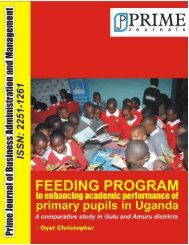

![See Full Article [pdf] - prime journals limited](https://img.yumpu.com/49292987/1/190x245/see-full-article-pdf-prime-journals-limited.jpg?quality=85)
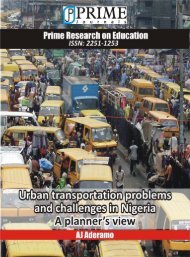

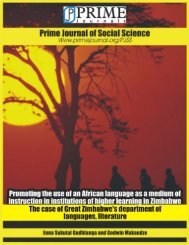
![See Full Article [pdf] - Prime Journals](https://img.yumpu.com/44526114/1/190x245/see-full-article-pdf-prime-journals.jpg?quality=85)
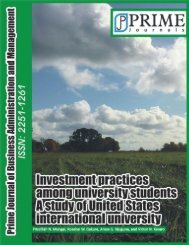

![See Full Article [pdf] - prime journals limited](https://img.yumpu.com/42270022/1/190x245/see-full-article-pdf-prime-journals-limited.jpg?quality=85)
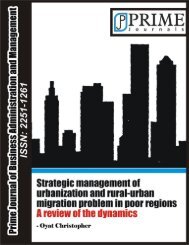
![See Full Article [pdf] - Prime Journals](https://img.yumpu.com/41607332/1/190x245/see-full-article-pdf-prime-journals.jpg?quality=85)
